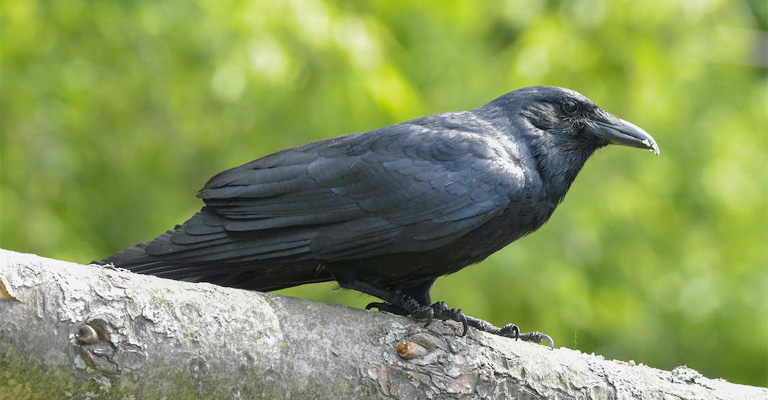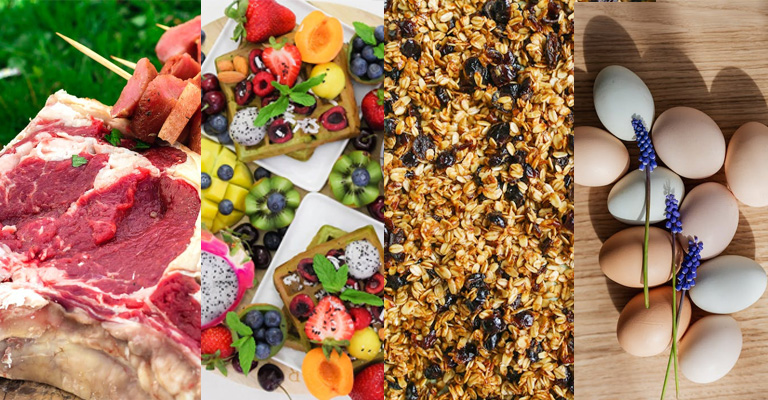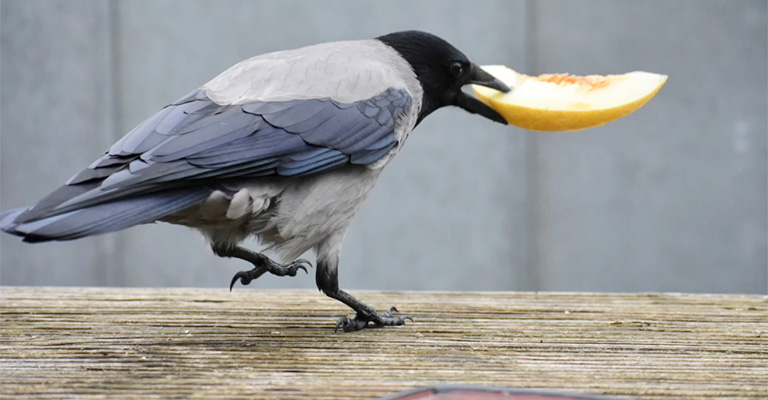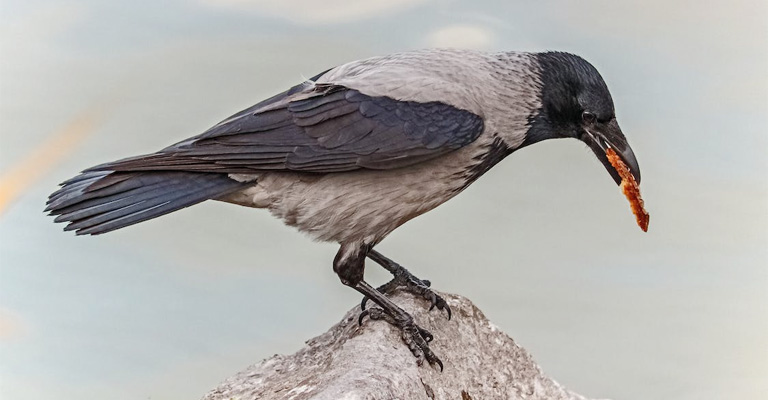The intriguing world of crows, marked by their intelligence, adaptability, and complex social structures, beckons those curious about building a unique connection with nature.
Befriending a crow is an art that requires patience, respect, and an understanding of these remarkable birds.
Crows have long fascinated humans with their clever problem-solving abilities and intriguing behaviors, making the prospect of forming a bond with them all the more captivating.
In this exploration, we embark on a journey to uncover the secrets of how to befriend a crow.
From the initial steps of patient observation to the delicate balance of offering food and maintaining respect for their boundaries, the journey of connecting with crows is one that reveals the profound interplay between the human world and the avian realm.
It’s an endeavour that promises to deepen our appreciation of nature’s wonders and the extraordinary relationships we can forge with the wild.

How To Befriend A Crow?
Here’s some important tips on how to befriend a crow:
Patience and Observation
Befriending a crow begins with patience and keen observation. Spend time near their habitat, such as parks or urban areas, and watch their behaviour from a distance.
Crows are intelligent and curious birds, so allow them to become familiar with your presence.
Offer Food
Crows are omnivores and enjoy a variety of foods. Start by offering small, unsalted treats like peanuts, cheese, or dog kibble. Establish a consistent feeding spot and schedule so the crows learn to associate you with food.
Use Positive Reinforcement
Crows respond well to positive reinforcement. Use soft, gentle tones while speaking to them. Be consistent in your behavior, and they’ll begin to recognize your voice and associate it with safety and food.
Avoid Eye Contact
Crows interpret direct eye contact as a threat. When trying to befriend them, avoid staring directly at them. Instead, glance at them occasionally while focusing on other activities, allowing them to feel more comfortable in your presence.
Gifts and Tokens
Crows are known for their intelligence and ability to recognize patterns. Occasionally, leave shiny objects, like pieces of foil or trinkets, near their feeding area.
Crows are naturally attracted to shiny things, and this gesture might intrigue and amuse them.
Be Patient and Consistent
Building trust takes time. Be patient, and continue your efforts consistently. Crows are cautious creatures, and it may take weeks or even months for them to approach you closely.
Stay committed to your daily routine of food offerings and positive interactions.
Respect Their Boundaries
Every crow has its own comfort zone. Some might prefer to stay a bit distant, while others may become more friendly over time. Respect their boundaries and individual personalities.
As your bond grows, they may choose to approach you on their terms.
Befriending a crow requires patience, consistency, and respect for their natural behaviors.
By offering food, using positive reinforcement, and being mindful of their boundaries, you can gradually build a relationship based on trust and mutual understanding.
What Do Crows Like To Eat?

Let’s discuss what do crows like to eat:
Meat
Crows are opportunistic omnivores and enjoy a wide variety of meats. They feast on small animals like insects, rodents, and even carrion. Roadkill or small carcasses are commonly scavenged, providing a significant portion of their diet.
Fruits
Crows have a taste for fruits, especially berries and apples. During the summer and fall, they relish ripe fruits, which provide essential vitamins and natural sugars. Orchards and gardens with fruit-bearing trees often attract crows.
Grains
Crows are known to feed on grains such as corn, wheat, and rice. They forage in agricultural fields, particularly after harvest, when spilled or leftover grains are abundant.
Grain-filled fields provide a substantial food source for these intelligent birds.
Nuts
Crows have strong beaks that allow them to crack open nuts and seeds. They are particularly fond of peanuts and acorns. Crows can be seen carrying nuts to a height and dropping them to break the shell, showcasing their problem-solving skills.
Eggs
Crows are opportunistic nest raiders and consume the eggs of other birds, especially smaller species. Their intelligence allows them to find and exploit nests, posing a challenge for smaller birds protecting their eggs.
Human Food Scraps
Crows are highly adaptive and often scavenge human food scraps. They are commonly seen near garbage bins or landfills, feeding on discarded food.
While this behavior raises concerns about their diet quality, it shows their ability to adapt to urban environments.
Small Invertebrates
Apart from larger prey, crows feed on a variety of small invertebrates like earthworms, insects, and spiders. Their foraging skills allow them to probe the ground for these creatures, making them efficient insect hunters.
Crows are opportunistic eaters, consuming a diverse range of foods including meat, fruits, grains, nuts, eggs, human food scraps, and small invertebrates.
This dietary flexibility contributes to their adaptability and wide distribution in various habitats, from rural fields to urban areas.
How Do You Present Food To Crows?

Presenting food to crows can be a rewarding way to connect with these intelligent and social birds.
Here are some ways to effectively offer food to crows:
Use a Feeder
Invest in a crow-friendly bird feeder, one that provides a platform or tray for crows to perch and access the food. Ensure it’s positioned in a safe and open area where the birds can easily spot it.
Scatter Food
Scatter small portions of food on the ground, such as unsalted peanuts, dog kibble, or birdseed. Crows often forage on the ground, and this method mimics their natural behavior.
Food on a Ledge
If you have a suitable window ledge or platform, you can place food there. Crows may become accustomed to this location and regularly check for offerings.
Build a Feeding Station
Create a dedicated feeding station by arranging food on a platform or tray attached to a post or tree. This setup provides a consistent and easily identifiable food source.
Scheduled Feeding
Establish a feeding schedule. Crows are known for their routines, and they’ll learn to visit during specific times when food is available. Consistency is key to building trust.
Shiny Objects
Occasionally leave shiny objects like pieces of foil or small trinkets near the food. Crows are attracted to shiny items, and this can pique their curiosity and interest.
Speak Softly
Crows can become accustomed to your voice and tone, so speak softly and gently when you’re near the feeding area. Over time, they’ll associate your presence with safety and food.
Remember that building a relationship with crows takes time, and it’s essential to be patient and consistent in your efforts. As the crows become more comfortable with your presence and offerings, they are likely to return regularly.
Why Don’t The Crows Trust Me?

Building trust with crows or any wild animal requires time, patience, and understanding. If crows don’t seem to trust you, several factors might be at play:
Inconsistency
Crows are creatures of habit. If you’re inconsistent with the timing or location of food offerings, crows might not establish a reliable pattern, leading to hesitance in approaching you. Regularity and predictability are crucial to gaining their trust.
Impatience
Trust-building with crows takes time, often weeks or even months. If you try to approach them too quickly or show impatience, they may perceive you as a threat. Crows are cautious birds, and patience is key to earning their confidence.
Direct Eye Contact
Crows interpret direct eye contact as a sign of aggression. If you stare at them, they may feel threatened and avoid you. Instead, try to glance at them occasionally without making prolonged eye contact.
Sudden Movements
Rapid or sudden movements can startle crows. If you move too quickly or abruptly, they may perceive you as a threat. Move slowly and calmly around them to avoid triggering their natural wariness.
Lack of Familiarity
Crows need time to recognize you as a non-threatening presence. If you’re a new face, it might take them a while to get used to your presence. Spend consistent, quiet, and non-threatening time around them to become familiar.
Negative Experiences
If crows have had negative encounters with humans, they may generalize that fear to all humans. If they have experienced harm or negative interactions, they might approach all humans with caution.
Intimidating Behavior
Crow behavior can be influenced by your body language. If you loom over them, make sudden gestures, or approach them aggressively, they will naturally be wary. To build trust, maintain a non-threatening posture and avoid sudden movements.
Remember, trust-building with wildlife is a gradual process. By being patient, consistent, and respectful of their boundaries, you can eventually earn the trust of the crows around you.
FAQs
How can I start befriending a crow?
Initiating a friendship with a crow begins with patience and observation. Spend time in areas where crows are present, and let them become accustomed to your presence.
What should I feed crows to befriend them?
Crows have varied diets, so consider offering unsalted peanuts, dog kibble, or birdseed. Start with small portions and maintain consistency in your feeding routine. Crows will learn to associate you with food, a crucial step in building trust.
How do I avoid scaring crows away?
Crows are sensitive to threatening behaviors. Avoid direct eye contact, sudden movements, or approaching too quickly. Maintain a calm and non-threatening posture to minimize any fright or discomfort.
Why won’t crows approach me?
Building trust with crows takes time. If they don’t approach you immediately, be patient and consistent in your efforts. Respect their boundaries and give them the space to become comfortable with your presence.
Can I befriend a crow in an urban environment?
Yes, crows are adaptable birds and can be befriended in urban settings. They often forage in cities and parks, making it possible to connect with them in urban environments.
Conclusion
Befriending a crow is a journey that bridges the human and avian worlds, unlocking the captivating intricacies of these intelligent and social birds.
As we conclude this exploration, we find that the key to befriending crows lies in respect, consistency, and patience.
Building trust with these creatures offers not only an opportunity for connection but also a window into the mysteries of the natural world.
Crows, with their sharp minds and intricate social structures, enrich our understanding of the animal kingdom and the beauty of forging bonds with the wild.
By following the guidelines of patience, observation, and respect for their boundaries, we embark on a journey of discovery and an enduring connection with these enigmatic birds.
It’s a testament to the marvels of nature and the meaningful relationships that can blossom when humans and wildlife meet on common ground.